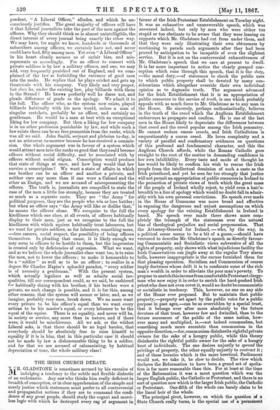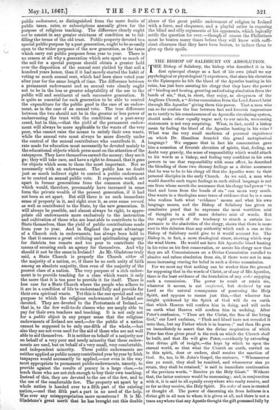THE IRISH CHURCH DEBATE.
MR.inGdLAD.nSgTaOtNeEndeisnesyomtoettihmes d e dbyflehixisbleenedimialeesctoicf subtle an of an ecclesiastic. Any one who thinks him really deficient in breadth of conception, or in clear apprehension of the simple and manly justice which statesmen must prefer to all controversial and propagandist notions if they are to command the confi- dence of any great people, should study the cogent and merci- less logic with which he destroyed every rag of argument in favour of the Irish Protestant Establishment on Tuesday night. It was an exhaustive and unanswerable speech, which was answered indeed, but only by men who were either too stupid or too obstinate to be aware that they were leaning on supports which Mr. Gladstone had cut from under them, and that they were only illustrating their own obtuseness by continuing to parade such arguments after they had been proved by anticipation to be incapable of even the slightest service. But it is not on the controversial exhaustiveness of Mr. Gladstone's speech that we care at present to dwell. It is far more important to notice the clearly grasped con- ception which runs through this speech, that it is the duty, —the moral duty,—of statesmen to check the public uses to which public property shall be devoted by many con- siderations which altogether override their own individual opinion as to dogmatic truth. The argument advanced for the Irish Establishment that it is an appropriation of public resources to the service of truth, is one which probably appeals with as much force to Mr. Gladstone as to any man in the House. He sincerely, perhaps enthusiastically, believes in the truth of the creed which the Anglican Establishment endeavours to propagate and confirm. He is one of the last men in the House likely to depreciate the differences between that creed and the creed popular among the Irish peasantry. He cannot endure coarse creeds, and Irish Catholicism is unquestionably a coarse creed. He loves complexity and a variety of parallel and confirmatory evidences on questions of this profound and fundamental character, and this the Anglican Church affords, while the Roman Catholic goes straight to the root of the matter in demanding confidence in her own infallibility. Every taste and mode of thought he has would be likely to confirm his wish to rescue the Irish people from the intellectual dominion of such a caste as the Irish priesthood, and yet he sees far too strongly that justice will not permit an appropriation of public resources in Ireland to the promotion of private views of truth which the great mass of the people of Ireland wholly reject, to yield even a hair's- breadth to a line of apology which would no doubt fall in admir- ably with his own personal convictions. No speech ever made in the House of Commons was more broad and effective in exposing the dangerous and unjust assumptions on which every apology for the existing Establishment in Ireland Is _ based. No speech ever made there shows more com- pletely the triumph of the statesman over the natural bias of theological prejudice and social prepossession. That the Attorney-General for Ireland, — who, by the way, in a political sense seems to be a bit of a goose,—should have ventured to describe Mr. Gladstone's speech as directly favour- ing Communistic and Socialistic views subversive of all the rights of property, only shows with what injudicious facility the Irish Conservatives can jingle away at the regular Tory alarm bells, however inappropriate is, the excuse furnished them for that pleasing operation. Socialism and Communism of course imply doctrines whose drift it is to confiscate some of the rich man's wealth in order to alleviate the poor man's poverty. To propose to snatch this income from comfortable Protestant clergy- man who now enjoy it in order to enrich the hard-pushed Irish priest who does not even covet it, would no doubt be communistic or socialistic in tendency. This, however, no one on any side of the House ever proposed. But to maintain that public property,—property set apart by the public voice for a public purpose in past ages,—can be so overridden by a special trust, that it belongs ever after more absolutely to the future devotees of that trust, however few and dwindled, than to the future successors of the public of the same nation, how- ever many and multiplied, is,—not indeed communism, but something much more eccentric than communism in the opposite direction —for, communism disinherits rightful private owners for the direction,—for, of a hungry public, while this theory disinherits the rightful public owner for the sake of a hungry knot of individuals. The one desires unjustly to spread the privilege of property, the other equally unjustly to contract it ; and of these heresies which is the more heretical, Parliament would not, we take it, be slow to decide. The view which declares the Reformation to have been a grand act of spolia- tion is far more reasonable than this. For at least at the time of the Reformation it was a moot question which was the larger English public, the Catholic or Protestant, and there is no sort of question now which is the larger Irish public, the Catholic or Protestant. One-fifth of the whole can barely claim to be the lineal heir of the whole.
The principal pivot, however, on which the question of a State Church really turns, is the special use of a permanent public endowment, as distinguished from the mere fruits of public taxes, rates, or subscriptions annually given for the purpose of religious teaching. The difference clearly ought not to consist in any greater strictness of condition as to ful- filling the terms of the old trust. Public property devoted to a special public purpose by a past generation, ought to be as easily open to the wider purposes of the new generation, as the taxes which carry out public purposes from year to year. There is no reason at all why a generation which sets apart so much of the soil for a special purpose should obtain a greater hold over the disposition of the annual rent yielded by that soil a hundred years hence, than if it had merely started the habit of voting so much annual rent, which had been since voted year after year for the same length of time. The difference between a permanent endowment and an annual vote clearly ought not to be in the less or greater adaptability of the use to the public will and sentiment of each successive generation. It is quite as essential for each generation to be able to control the expenditure for the public good in the case of an endow- ment, as in the case of an annual vote. The true difference between the two should not be in the greater or less power of embarrassing the trust with the conditions of a past-away creed, but in this,--that the yield of the permanent endow- ment will always be more applicable to the wants of the very poor, who cannot raise the means to satisfy their own wants, while the annual vote must always be more directly under the control of the annual contributors who contribute it. A rate made for education must necessarily be devoted mainly to the educational objects which press most on the attention of the ratepayers. They have themselves earned the money; they see it go; they will take care, and have a right to demand, that it goes for objects which seem to them the most important. Not so necessarily with an endowment. The public has no doubt just as much indirect right to control a public endowment as to control an annual public vote. It represents wealth set apart in former generations from the common stock, and which would, therefore, presumably have increased in some form the private wealth of the present generation, if it had not been so set apart. But still there is no such immediate sense of property in it, and right over it, as over sums earned, as well as contributed to the State, by the new generation. It will always be possible, and almost always be right, to appro- priate old endowments more exclusively to the instruction and cultivation of those who are least able to contribute to the State themselves, than the yield of public contributions made from year to year. And in England the great advantage of a Church rich in endowments, has always been held to be that it ensures a great civilizing and spixitualizing agency for districts too remote and too poor to contribute the means of securing such an agency for themselves. And why should it not be the same in Ireland ? As Mr. Gladstone truly said, a State Church is properly the Church either of the majority of a nation, or, if there be no such unity of faith among an absolute majority, then even of the majority of the poorest class of a nation. The very purpose of a rich endow- ment is to provide teaching for a class which wants it only the more that it is too poor to provide it for itself. There is less case for a State Church where the people who adhere to it are in a condition of life to understand fully and provide for their own spiritual wants. Yet this is the one special and only purpose to which the religious endowments of Ireland are devoted. They are devoted to the Protestants of Ireland,— that is, to the few well-to-do classes who are amply able to pay for their own teachers and teaching. It is not only not for a public object in any proper sense that the religious endowments of Ireland are used,—for the public of a nation cannot be supposed to be only one-fifth of the whole,—but also they are not even used for the aid of those who are not well able to aid themselves. It is neither on behalf of a majority nor on behalf of a very poor and needy minority that these endow- ments are used, but on behalf of a very small, very comfortable, and independent minority. These public endowments are neither applied as public moneycontributed year byyear by Irish taxpayers would necessarily be applied,—nor even in the way most appropriate to permanent public endowments, namely, to provide against the results of penury in a large class,—to teach those who are not rich enough to buy their own teaching. Instead of this, they are devoted to the use of the few, and to the use of the comfortable few. The property set apart by a whole nation is handed over to a fifth part of the existing nation,—and that fifth part a part in no need of the help. Was ever any misappropriation more monstrous? It is Mr. Gladstone's great merit that he has brought out this double abuse of the great public endowment of religion in Ireland with a force, and eloquence, and a playful satire in exposing the blind and silly arguments of his opponents, which logically settle the question for ever, —though of course the Philistines must be beaten many times before they will know with suffi- cient clearness that they have been beaten, to induce them to give up their spoils.































 Previous page
Previous page